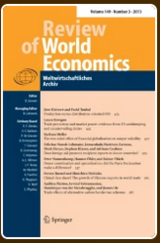Externe Publikationen

Africa’s regional and global integration: introduction to the Special Issue
Brandi, Clara / Katrin Kamin / Rainer ThieleExterne Publikationen (2025)
in: Review of World Economics, first published 07.04.2025
DOI: https://doi.org/10.1007/s10290-024-00577-x
Open access
Africa is at a crucial crossroads in its journey toward deeper regional and global economic integration. While remaining the most isolated region from the global economy, Africa has realized continuous progress towards a closer and more active integration, both from within and beyond the continent’s borders. The recently introduced African Continental Free Trade Area (AfCFTA) is a cornerstone of Africa’s regional integration agenda, aiming to be the world’s largest free trade area by population. The AfCFTA is essential because it provides a framework to unlock Africa’s immense economic potential by addressing the continent’s fragmentation. It has the potential to boost Africa’s income, driven by increased trade, foreign direct investment (FDI) and industrialization. Meanwhile, closer international ties beyond Africa, including China’s infrastructure investments and the European Union’s trade agreements, have offered new pathways for global integration, including via participation in global value chains (GVCs). Regional integration is essential for Africa’s economic development because it addresses the structural challenges that fragment the continent’s economies and limit their global competitiveness. Africa is characterized by small, disconnected markets with significant trade barriers. Infrastructure deficits, weak institutional frameworks, and uneven productivity continue to hinder Africa’s ability to leverage these opportunities for inclusive and sustainable growth. Regional integration, by reducing tariffs, harmonizing regulations, and improving connectivity, helps create larger, more efficient markets that are attractive to investment and capable of supporting more diversified economic activity. Trade facilitation measures, such as improving port efficiency and reducing non-tariff barriers, are vital to unlocking Africa’s export potential. The drivers and effects of these developments remain insufficiently understood. To address the remaining research gaps the German Institute of Development and Sustainabil ty (IDOS) and the Kiel Institute for the World Economy (IfW) jointly organized the conference “Africa’s regional and global integration – Lessons from the past and implications for the future”, taking place at IDOS in Bonn on 17/18 November 2022 with financial support from the Federal Ministry for Economic Cooperation and Development (BMZ). This conference formed the basis for this special issue. Selected papers from the conference and additional contributions are combined in a collection of eleven papers on Africa’s regional and global economic integration to shed light on Africa’s promise and pitfalls in promoting economic integration and development.
Kontakt
Cornelia Hornschild
Koordinatorin Publikationen
E-Mail Cornelia.Hornschild@idos-research.de
Telefon +49 (0)228 94927-135
Fax +49 (0)228 94927-130
Alexandra Fante
Bibliothekarin/Open Access-Koordinatorin
E-Mail Alexandra.Fante@idos-research.de
Telefon +49 (0)228 94927-321
Fax +49 (0)228 94927-130



